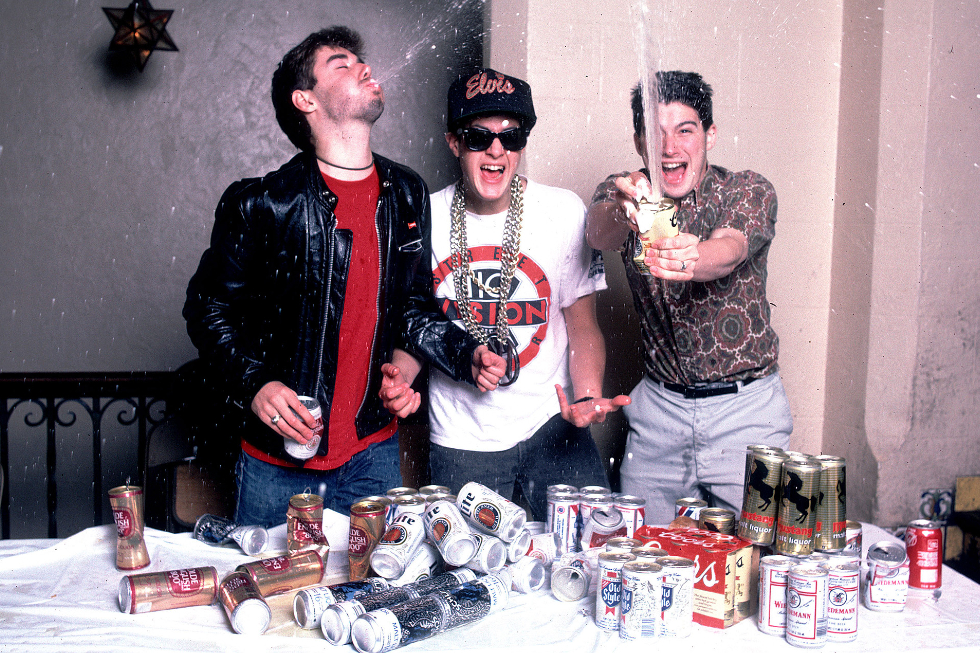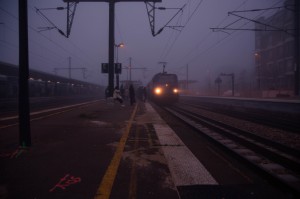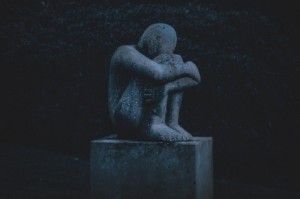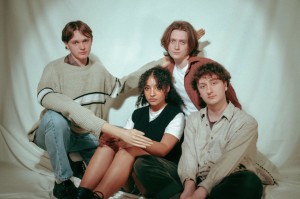People Places: On Music and Nostalgia

Why does the music we listen to in our teens matter so much? Mike Pinnington takes a deep dive into his own formative years to investigate…
I’m four years old. A sickly child, I’m stuck at home one weekend when someone (probably my mum) returns from the shops with Adam and the Ants’ single, Prince Charming. It’s 1982 and I’ve been bought music for the first time. It’s on vinyl. Although I occasionally leafed through my Dad’s records (Thin Lizzie, Hendrix, Dire Straits, Rory Gallacher), I know for sure this is the first song I’ve listened to with a sense of it being mine. My babysitters were obsessed with Wham, Spandau Ballet and Duran Duran. What on earth were they thinking? A few years later and I’m eight; The Beastie Boys (pictured), who my mum deeply disapproves of to this day, are met with tabloid derision usually reserved (then and now) for Labour leaders. I, of course, take mum’s condemnation as a sign that this is a band worth knowing. Despite this early brush with fandom, my love of music isn’t yet truly ignited and won’t be until many years later.
I’m now in high school and, like most of my friends, trying to work out who I am, so that I can wear this burgeoning identity like a badge. Nirvana’s Nevermind has played its part in the nascent adolescent awakening – although I never really cared for Kurt, Krist and Dave’s big breakthrough record. It was the more rough and ready stuff that was being passed around our small peer group on tape, like Bleach and Incesticide, that made the deeper impression. (I also had a bootleg of them playing what I thought was Glasgow Barrowlands; a quick Google fails to confirm they ever did.) Today, weirdly, it rarely crosses my mind that Nirvana played any such role in the early shaping of my tastes and sense of individuality. Nor, in fact, do I ever listen to them. I’m not quite sure why this is; perhaps, simply, I was too immature, or – more likely – those mid-teenage years too much of a confusing slog.
Things change irreversibly a couple of years later. It’s 1994, I’m sixteen, and ostensibly studying for my A Levels. By now, though, I’m over education, and in danger of sleepwalking through these two years. The tape recorder in our sixth form common room is a different matter, however, waking me up between classes. A revelation, it brings different people’s worlds into view. Alongside the stuff that never really lodged itself in my tastes long enough to stick (Green Day, the Manics and Bjork among others), one day somebody plays Weezer’s Undone – The Sweater Song. It was love at first listen. While the catchy as hell Buddy Holly was their big hit, The Sweater Song had layers, used metaphor and sounds like nothing else I’ve heard up until this point. It makes me feel like I’m developing as a listener. Alongside this amazing exposure to new bands, I’m exploring closer to home and looking back at the Beatles. Sgt. Pepper’s Lonely Hearts Club Band, I know, is their most iconic and (supposed to be) best album, but I favour Rubber Soul and Revolver, The White Album and Abbey Road. In truth, though, there is something on each album in turn that I love.
I’m seventeen and at a friend’s house for lunch. This is always dangerous as my waning interest in school means we risk not returning for the day. It doesn’t matter. On this occasion, he plays me David Bowie’s Ziggy Stardust and the Spiders from Mars. Shortly after (I think), another friend gave me a tape. On it was The Velvet Underground & Nico’s I’m Waiting for the Man. Bowie and the VU in quick succession. Things would never be the same. Around this time, we start forging IDs. Or, at least, a friend of a friend knows someone who knows someone that can. Until now, access to new music has been dictated by Top of the Pops, word of mouth, the NME and Melody Maker and it’s fair to say listening habits remain pretty narrow as a result. Suddenly, the doors were blown open, and new favourites made seemingly weekly.
During these years, like panning for gold and hitting the jackpot every Saturday night (providing the fake ID did its job), I’m introduced to waves of new sounds (mostly via Liverpool’s gone but not forgotten Mardi Gras, on Bold Street). This leads me and my friends to bands that would stay with us for years to come: Pulp, Elastica, Suede and others were in the vanguard, alongside some of the landfill indie that swiftly followed on their heels. As well as this swathe of closely related guitar bands, I hear Beck, the Prodigy and the Chemical Brothers for the first time. The Beastie Boys come back into my life at this point, too. Music discovered, obsessed over and danced to at this time largely informed and dictated my tastes to this day (more recent music crushes, like Eleanor Friedberger, Ought, Parquet Courts and Car Seat Headrest, I’ve included in the accompanying playlist).
It’s 2019 and I’m 41. The Beatles’ Sgt. Pepper’s Lonely Hearts Club Band has recently been remixed by Giles Martin, son of the legendary Beatles producer George, to be played as an ‘immersive experience’. I’m sat in the dark, surrounded by an array of Dolby Atmos ® speakers. Despite the slightly distracting presence of the man from the local TV news, when the band strikes up to play all sense of time and place shifts. It begins with a creeping sensation up the back of my neck. My hair is on end and my throat feels thick, like it does when you’re going to cry. My eyes prickling slightly, I’m transported back to my bedroom, aged sixteen or seventeen, singing along with John, Paul, George and Ringo. It’s an incredible demonstration of the power of music and its relationship to memory and nostalgia.
I’m 42 and I’m writing this as, lately – beginning with that Sgt. Peppers experience, I think – I’ve found myself beset by nostalgia. Whether sat in a coffee shop (in a time shortly before the lockdown), or at home minding my own business, I’m confronted by slivers and echoes of my past listening. Such instances have been happy and sad, sometimes both. Music can move us through time and place like nothing else. Particular songs – effortlessly and without warning – transport us back to certain points in our lives as soon as we hear the opening bars. It’s not always songs: Douglas Coupland’s book of pre-millennial tension, Girlfriend in a Coma, will always whisk me off to the family holiday and self-indulgent trip of ennui I was on when I first read it, post-graduation. But it is music that does this most effectively.
While I’ve continued to listen to new music, nothing floods me with feeling in quite the same way as the stuff I was dancing to in my most formative of years. This disproportionate eliciting of emotions, I’m sure, is something you’ll recognise in yourself and others – how many times have you heard somebody say: “Oh, this takes me back”? When we listen to songs that are wrapped around, run through and bolster the sense of our younger selves, this activates something in us (research suggests it’s the prefrontal cortex doing this), which, in turn affects our emotional state. This exposes an inconvenient truth: no matter how objectively ‘good’ a new song we might hear today is, we’ll never care about it as much as those that pointed the way to the people we became. That is not to diminish the power of music; nor is it to say we should stop listening as we get older. Music retains that power for as long as we let it into our lives. It can energise us, boost our mood, and – speaking entirely unscientifically – enrich our souls. It is a common language that opens up and transports us to new worlds – and old – whenever we like.
Mike Pinnington
Image: Beastie Boys





